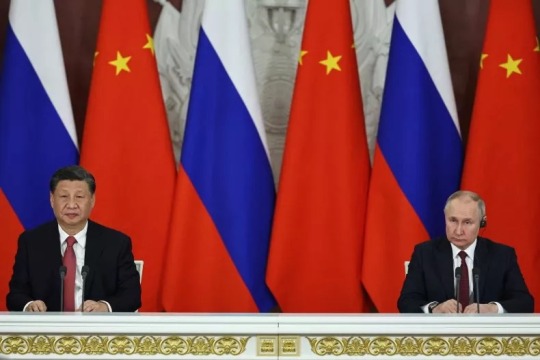#Russia 🇷🇺 Ukraine 🇺🇦
Explore tagged Tumblr posts
Text
World: The West Isn't Buying Into China's Year of Diplomacy

Chinese President Xi Jinping at a press conference in Shaanxi, on May 19, 2023. A new poll indicates that the West does not believe that China is contributing to Global Security. Florence Lo/Pool/AFP Via Getty Images
Western nations increasingly see China as an interventionist power that is not improving global security, according to recent polling, as Beijing struggles to square its desired peacemaker image with the political realities of its expanding global influence.
The Pew Research Center conducted a 30,000-person survey across 24 nations between February and May and found that people living in European, North American and Indo-Pacific democracies are particularly wary of China's influence. The sentiment was less strong, though still present, among African and South American respondents.
A median of 71 percent of the 30,000 people polled felt that China does not contribute either much or at all to international peace and stability, versus 23 percent who felt China does. Americans (80 percent), Dutch (86 percent), British (80 percent), Germans (80 percent), and French (75 percent) were among those who felt most strongly that Beijing is a negative influence on global affairs.
Democratic Indo-Pacific nations emphatically agreed, with 87 percent of South Koreans, 85 percent of Australians, and 85 percent of Japanese feeling the same.
The list of nations—the United States, Canada, France, Germany, Greece, Italy, Japan, Netherlands, South Korea, Spain, Sweden, the United Kingdom, Argentina, Brazil, Hungary, India, Indonesia, Israel, Kenya, Mexico, Nigeria, Poland and South Africa, and Australia—is dominated by Western liberal democracies, with inherent ideological tensions likely somewhat explaining the negative views of Chinese foreign influence.
But only in Indonesia, Kenya and Nigeria did a majority of respondents say Beijing contributes either a fair amount or a great deal to international peace and stability.
Newsweek reached out to the Chinese Foreign Ministry via email for comment.
China—already considered by many an economic and technological superpower—is still shaping its military and diplomatic clout abroad. Major decades-long investment in the former is openly intended to eventually challenge American hegemony, but on the diplomatic battlefield, Beijing is following a less publicly combative path.
Among the salient diplomatic issues that have helped shape global opinions of China this year are one striking success and one ongoing failure.
The former was the landmark Iran-Saudi Arabia normalization deal signed in April, in which China unexpectedly brokered a détente few thought likely given the deep and historic animosity between the Middle East's power players.
But China's unconvincing neutrality regarding Russia's war on Ukraine has somewhat eroded global trust in Beijing, particularly among the Euro-Atlantic and Indo-Pacific nations rallying to Kyiv's cause. China's de facto backing for Russia has undermined its continued calls for peace and the anemic peace plan it proposed in March.
North vs. South
Larger issues involving China—among them the fate of Taiwan, the situation in the South China Sea, lingering frustrations about the pandemic, the brewing showdown with the U.S., human rights, and concerns about political interference—have "completely dwarfed" Beijing's diplomatic efforts, Andrew Small, a senior transatlantic fellow at the German Marshall Fund, told Newsweek.
"Publics have evidently not seen either the Saudi-Iranian deal as particularly significant or the Chinese efforts on Ukraine as particularly credible," Small said.
Small noted Beijing will not necessarily be too concerned with continued Western skepticism.
"In one sense, the argument for what China has been trying to do on Ukraine and in some of these other efforts was positioning in the 'Global South,'" he said. "The view on their side had been that no one in Europe is going to take this seriously, but they are able to position themselves through this in the Global South as an actor that approaches these issues in a neutral way."

Russian President Vladimir Putin (R) and China's President Xi Jinping deliver a joint statement in Moscow, on March 21, 2023. China's de facto support of Russia's war on Ukraine has angered Western nations. Mikhail Tereshchenko/Sputnik/AFP Via Getty Images
But the poll's findings also suggest that Beijing's self-framing might not be playing out as it hoped. A median of 57 percent of those surveyed said they felt China interferes in other countries affairs either a fair amount or a great deal.
The sentiment was most notable in Europe, where a majority of national respondents excluding Hungarians agreed, as well as in North America. A majority of all those in Indo-Pacific nations apart from Indonesia saw Beijing as interventionist.
Even in the four of the six African and South American nations surveyed a majority said China intervened at least somewhat in other countries' affairs. Fifty percent of South Africans and 46 percent of Argentinians also agreed.
"It's such a mantra in Chinese foreign policy, so foundational in the way that they frame things that this is not what they do, and it is the antithesis of the Western approach," Small said.
Against this backdrop, Small added, it is "striking" to see so many nations feeling that China is indeed intervening abroad. The data suggests, he said, that the perception of Chinese anti-interventionism is being "shredded."
Recent months have seen a renewed China-U.S. effort to thaw chilly bilateral relations. In June, Secretary of State Antony Blinken visited Beijing to meet with Chinese President Xi Jinping. And earlier this week, Blinken told CNN the U.S. wants to "put some stability into the relationship."
But the long-term disputes show no signs of easing. While visiting Tonga this week, Blinken hit out at what he called China's "increasingly problematic behavior" in the Indo-Pacific.
In Europe too, major nations are increasingly concerned about Chinese espionage and influence, even if leaders like French President Emmanuel Macron and German Chancellor Olaf Scholz are still courting investment.
Worsening Euro-Atlantic ties with Beijing, Small said, might accelerate a brewing confrontation.
"To a certain extent, this will validate an analysis on the Chinese side that starts to write off the West," he said, and instead focus on a "winnable" public opinion battle in the developing world.
— Newsweek Magazine | By David Brennan | July 27th, 2023
#World#China 🇨🇳#Diplomacy#Western Nations#Peacemaker Image#Beijing#Global Influence#China's Influence#Americans 🇺🇸 Dutch 🇳🇱 British 🇬🇧 Germans 🇩🇪 French 🇫🇷#Iran 🇮🇷 Saudi Arabia 🇸🇦#Russia 🇷🇺 Ukraine 🇺🇦#Taiwan 🇹🇼#South China Sea#Andrew Small#German Marshall Fund#Global South#Europe 🇪🇺#North America#Indo-Pacific Nations#South Africans#China🇨🇳 | U.S. 🇺🇸#Secretary of State Antony Blinken#Tonga 🇹🇴#Chinese President Xi Jinping#French President Emmanuel Macron#German Chancellor Olaf Scholz#Euro-Atlantic#Developing World
0 notes
Text




𝚁𝚎𝚕𝚒𝚐𝚒𝚘𝚗 𝚒𝚜 𝚊 𝙼𝚎𝚗𝚝𝚊𝚕 𝚒𝚕𝚕 𝚗 𝙰𝚜𝚜 ☑️
Church of the Nativity of John the Baptist. Saint Petersburg 🇷🇺
#Travelingwithoutmoving 🍭
#architecture #architecturephotography #architecturelovers #architectureporn #architecturedesign #architecturelover #architecturephoto #architecturedaily #architecture_hunter #architecturedetail #architecturephotos #architecturedose #architectureanddesign #architecturelife #architecturegram #architecturelove #architecturephotograpy #architectures #architectureinspiration #architecture_view #architektur #architekturfotografie #architekturfotograf #architektur_erleben #architekturliebe #architekturporn #architekturelovers
Rave in the Grave by REDZED 🎧🍭

#l o v e#saint petersburg#sankt petersburg#russia#5/2024#baptist church#Nativity of John the Baptist#nativity#church#architecture#architecture photography#Candy#candy land#aesthetic#traveling#travel#peace in the Ukraine 🇺🇦#churches#x-heesy#now playing#music and art#contemporaryart#Rave in the Grave#religious art#religion is a mental illness#🇷🇺#russia 🇷🇺
40 notes
·
View notes
Text
Christmas Azerbaijan E190 Crash
youtube
#embraer#e190#azerbaijan#shoot down#crash#plane crash#aviation#russia#ukraine#russo ukrainian war#🇷🇺#🇦🇿#🇺🇦#Youtube
4 notes
·
View notes
Text
⁎˚ ఎ Hetalia Moodboard ໒ ˚⁎

•Sfw interactions only | dont tag as ship ! •Don't repost and claim as yours ! Reblogs are okay but not reposts

#🌷੭ moodboard#edit#free to reblog#sfw post#hetalia moodboard#hetalia russia#aph hetalia#hetalia world series#hetalia#hetalia axis powers#ukraine#hetalia ukraine#ivan#russia#not a ship#moodboard#mood board#russia aesthetic#russia aph#snow aesthetic#spring#winter#opposite theme#blue and green#anime moodboard#landscape#across the world#russia 🇷🇺#ukraine 🇺🇦
14 notes
·
View notes
Text
Ironic points of light.
In “September 1, 1939,” W. H. Auden reflects on the political and social turmoil at the onset of World War II. The line “ ironic points of light” appears in the penultimate stanza: “Defenceless under the night Our world in stupor lies; Yet, dotted everywhere, Ironic points of light Flash out wherever the Just Exchange their messages:” In this context, the “ ironic points of light” symbolize…

View On WordPress
#🇪🇺European union#🇮🇱Israel#🇵🇸Palestine#🇷🇺 Russia#🇺🇦 Ukraine#🇺🇸US#Geo politics#military aggressors#UK politics
0 notes
Text
https://www.instagram.com/reel/Cxk_tsVN7fa/?igshid=MTc4MmM1YmI2Ng==
0 notes
Text
🔎 PHOTO FINDER
🏆 BEST Most Popular | Editor's Choice
📍 COUNTRY All Countries (94) | 🇦🇷 Argentina | 🇦🇺 Australia | 🇧🇪 Belgium | 🇧🇷 Brazil | 🇨🇦 Canada | 🇨🇳 China | 🇨🇴 Colombia | 🇨🇿 Czech Republic | 🇫🇷 France | 🇩🇪 Germany | 🇭🇺 Hungary | 🇮🇩 Indonesia | 🇮🇱 Israel | 🇮🇹 Italy | 🇯🇵 Japan | 🇲🇽 Mexico | 🇳🇱 Netherlands | 🇳🇿 New Zealand | 🇳🇴 Norway | 🇵🇭 Philippines | 🇵🇱 Poland | 🇵🇹 Portugal | 🇷🇴 Romania | 🇷🇺 Russia | 🇿🇦 South Africa | 🇰🇷 South Korea | 🇪🇸 Spain | 🇸🇪 Sweden | 🇹🇭 Thailand | 🇺🇦 Ukraine | 🇬🇧 United Kingdom | 🇺🇸 USA | 🇻🇪 Venezuela | More...
♀️ TYPE Asian | Blonde | Brunette | Ebony | Latina | Redhead
🍑 BODY Butt | Eyes | Feet | Flexible | Legs | Smile | Tan Lines | Tattoo | Thick | Wet
👙 CLOTHING/ACCESSORY Bikini | Denim | Glasses | Hat | High Heels | Lingerie | One-Piece Swimsuit | Shirt | Shorts | Skirt | Sneakers | Socks | Stockings
🙈 LACK OF CLOTHING Birthday Suit | Body Paint | Hairbra | Handbra
🏖️ SETTING Bath | Beach | Bed | Boat | Car | Kitchen | Nature | Office | Pool | Shower
🤠 COSTUME Cheerleader | Cosplay | Cowgirl | Maid | Nurse | Patriotic | Schoolgirl | Stewardess
🤳🏻 MISCELLANEOUS Duo | Mirror | Selfie | Sisters | Upskirt
📂 ARCHIVE July 2025 | June 2025 | May 2025 | April 2025
180 notes
·
View notes
Text
28 September 2014 – 21 January 2015
The last stand of the Ukrainian "Cyborgs", singing the Ukrainian national anthem at the end of Second Battle of Donetsk Airport. 2014
16 notes
·
View notes
Text
HERE is the list of the 134 countries that are NOT supporting South Africa's 🇿🇦 claims of genocide against Israel 🇮🇱:
🇦🇩 Andorra
🇦🇴 Angola
🇦🇬 Antigua and Barbuda
🇦🇷 Argentina
🇦🇲 Armenia
🇦🇺 Australia
🇦🇹 Austria
🇧🇸 Bahamas
🇧🇧 Barbados
🇧🇾 Belarus
🇧🇿 Belize
🇧🇹 Bhutan
🇧🇦 Bosnia and Herzegovina
🇧🇼 Botswana
🇧🇬 Bulgaria
🇧🇮 Burundi
🇨🇻 Cabo Verde
🇰🇭 Cambodia
🇨🇦 Canada
🇨🇫 Central African Republic
🇨🇱 Chile
🇨🇳 China
🇰🇲 Comoros
🇨🇬 Congo
🇨🇷 Costa Rica
🇭🇷 Croatia
🇨🇺 Cuba
🇨🇾 Cyprus
🇨🇿 Czech Republic
🇨🇩 Democratic Republic of the Congo
🇩🇰 Denmark
🇩🇲 Dominica
🇩🇴 Dominican Republic
🇹🇱 East Timor (Timor-Leste)
🇪🇨 Ecuador
🇸🇻 El Salvador
🇬🇶 Equatorial Guinea
🇪🇷 Eritrea
🇪🇪 Estonia
🇸🇿 Eswatini
🇪�� Ethiopia
🇫🇯 Fiji
🇫🇮 Finland
🇫🇷 France
🇬🇪 Georgia
🇩🇪 Germany
🇬🇭 Ghana
🇬🇷 Greece
🇬🇩 Grenada
🇬🇹 Guatemala
🇭🇹 Haiti
🇭🇳 Honduras
🇭🇺 Hungary
🇮🇸 Iceland
🇮🇳 India
🇮🇪 Ireland
🇮🇹 Italy
🇯🇲 Jamaica
🇯🇵 Japan
🇰🇪 Kenya
🇰🇮 Kiribati
🇰🇵 Korea, North (North Korea)
🇰🇷 Korea, South (South Korea)
🇽🇰 Kosovo
🇱🇦 Laos
🇱🇻 Latvia
🇱🇸 Lesotho
🇱🇷 Liberia
🇱🇮 Liechtenstein
🇱🇹 Lithuania
🇱🇺 Luxembourg
🇲🇬 Madagascar
🇲🇼 Malawi
🇲🇹 Malta
🇲🇭 Marshall Islands
🇲🇺 Mauritius
🇲🇽 Mexico
🇫🇲 Micronesia
🇲🇩 Moldova
🇲🇨 Monaco
🇲🇳 Mongolia
🇲🇪 Montenegro
🇲🇲 Myanmar (Burma)
🇳🇷 Nauru
🇳🇵 Nepal
🇳🇱 Netherlands
🇳🇿 New Zealand
🇳🇮 Nicaragua
🇲🇰 North Macedonia (Macedonia)
🇳🇴 Norway
🇵🇼 Palau
🇵🇦 Panama
🇵🇬 Papua New Guinea
🇵🇾 Paraguay
🇵🇪 Peru
🇵🇭 Philippines
🇵🇱 Poland
🇵🇹 Portugal
🇷🇴 Romania
🇷🇺 Russia
🇷🇼 Rwanda
🇰🇳 Saint Kitts and Nevis
🇱🇨 Saint Lucia
🇻🇨 Saint Vincent and the Grenadines
🇼🇸 Samoa
🇸🇲 San Marino
🇸🇹 Sao Tome and Principe
🇷🇸 Serbia
🇸🇨 Seychelles
🇸🇱 Sierra Leone
🇸🇬 Singapore
🇸🇰 Slovakia
🇸🇮 Slovenia
🇸🇧 Solomon Islands
🇪🇸 Spain
🇱🇰 Sri Lanka
🇸🇪 Sweden
🇨🇭 Switzerland
🇹🇼 Taiwan
🇹🇿 Tanzania
🇹🇭 Thailand
🇹🇴 Tonga
🇹🇹 Trinidad and Tobago
🇹🇳 Tunisia
🇹🇲 Turkmenistan
🇹🇻 Tuvalu
🇺🇦 Ukraine
🇬🇧 United Kingdom (UK)
🇺🇸 United States of America (USA)
🇺🇾 Uruguay
🇻🇺 Vanuatu
🇻🇦 Vatican City
🇻🇳 Vietnam
🇿🇲 Zambia
🇿🇼 Zimbabwe
447 notes
·
View notes
Text
The End of Modernity! A Crisis Is Unfolding Before Our Eyes—And Also In Our Heads.
— June 30, 2025 | By Christopher Clark | Foreign Policy

Sara Gironi Carnevale Illustration For Foreign Policy Magazine
This year, Europe celebrated the 80th anniversary of the end of World War II and the beginning of what came next. The declaration of Austrian independence on April 27, 1945, marked an early step out of one era in the history of the country and the continent into another. Viewed from a distance, such moments can look like smooth, frictionless transitions, mere points on a timeline. We easily forget how open the future still was, how turbulent and uncertain the contemporary setting.
When independence was declared in Soviet-occupied Vienna and people danced Johann Strauss’s “Blue Danube” waltz on the Ringstrasse to the music of a Soviet military band, World War II was still underway. On the day following independence—April 28—August Eigruber, the Nazi regional leader for Upper Austria, ordered the gassing of resistance fighters in the Mauthausen concentration camp. In the first week of May, after Adolf Hitler’s suicide in Berlin, men of the Waffen-SS killed 228 Hungarian Jews in the leafy little town of Hofamt Priel in Lower Austria.
For the newly proclaimed republic, the political future was anything but certain. The new provisional government was at first recognized only by the Soviet Union. Not until Oct. 20, 1945, was the new state recognized by Britain, France, and the United States through a resolution of the Allied Control Council. And one of the fascinating features of the refoundation of the republic was its recursive quality: Article 1 of the 1945 declaration of independence stated unequivocally that this was not an act of foundation but one of “reestablishment,” to be carried out in the “spirit” of the 1920 constitution, drawn up by a defeated Austria in the aftermath of World War I.

In order to plot a path into the future, people looked to the past. And when we look back today on the 80 years that have passed since that act of reestablishment, they seem at first glance to fall into two very different halves. The first, which lasted from the end of World War II until 1989-90, was marked, in Europe at least, by a lasting peace, comparable with the decades of geopolitical stability that followed the 1814-15 Congress of Vienna. A more drastic contrast with the chronic instability and polarization of 1914-45 could scarcely be imagined. The West entered an era of public tranquility and economic growth, supported by the United States. The time of street fighting, coups, and authoritarian experiments was over.
There was plenty of violence and conflict in the world at that time, but the turbulence was contained within a bafflingly simple structure: the bipolar stability of the Cold War, underwritten by the standoff between two nuclear superpowers. Events were as unpredictable then as always: Recall the reputed words of British Prime Minister Harold Macmillan when he was asked by a journalist to explain what had gone so disastrously wrong in the 1956 Suez crisis: “Events, dear boy, events.” But the outer framework was stable.
All this began to change as the Cold War came to an end and something different took its place. What that something is is under discussion. We are still working it out.
The era we are in now got off to a beautiful start, and we shouldn’t forget that. In 1989-90, the dissolution of the Eastern Bloc produced a profound transformation in the geopolitical structure of Europe. A new German state emerged. (The Germany of 1990 was not the old Germany reunited but an entirely new state with new territorial boundaries.) And all of this happened without a war. That is extraordinary. The Peace of Westphalia in 1648; the emergence of a unified German Reich in 1871; the reordering of Central Europe after 1918 under the terms imposed by the treaties of Versailles, Saint-Germain-en-Laye, Trianon, and Sèvres; and the partition of Europe after 1945—these transformations were all brought about by wars and were paid for in millions of lives. When you add them all together, it comes to 68 million people whose lives were consumed in this process of geopolitical readjustment.
It was different in 1989-90. A 40-year-old Eastern European security system had been dismantled, the armed standoff between capitalism and communism decommissioned, a new German state created, and the balance of power on the continent placed in question—all without a war. Europe breathed a sigh of relief, and one could and did look with a certain pride on what had been achieved.

Desert Storm Victory Parade, New York, 1991.Joseph Sohm/Visions of America/Corbis Via Getty Images
It is what came next that created the world we are in now: the self-demolition of the Soviet Union, the economic and societal collapse of Russia, the Yugoslav Wars, the two Chechen Wars, the 9/11 attacks, the war in Afghanistan, the Iraq War and its long aftershocks, the Georgia crisis, the global financial crisis, the Ukraine crisis, the Greek financial crisis, the European migrant crisis. Instead of collapsing or fragmenting, as many in Washington and elsewhere had hopefully predicted after the Tiananmen Square massacre, China entered a phase of breathtaking growth. As Kristina Spohr, a historian at the London School of Economics, has pointed out, the resolute crushing of an incipient democracy movement by the Chinese government in 1989 was just as important in shaping our present as the fall of the Berlin Wall later that year. Our world bears the dual imprint of the almost simultaneous transformations of 1989 in Beijing and Berlin. The Chinese Communist Party held fast to the one-party system at the same time as it pressed ahead with the conditional integration of the country into the world economy. None of this had been foreseen.
“There was a sense that one had reached the culmination point of a long historical evolution. One was standing on the high ground of modernity.”
Political scientist George Friedman has observed that we need to distinguish between two periods since 1989. The first we could call the “post-Cold War.” It extended from 1990 until the years between 2004 and 2007. This postwar era was at first marked by an overwhelming focus on U.S. power. The world seemed to revolve around Washington. The phrase “New American Century” was in vogue, and U.S. military leaders spoke of “full-spectrum dominance.”
One U.S. Army working paper, written in 1992, argued that Operation Desert Storm constituted the high point of military achievement in the entirety of human experience. Using a sketchy outline of three large battles—the Napoleonic Battle of Ulm in 1805, the German attack on France in 1940, and Operation Desert Storm in 1991—the paper constructed a narrative of increasing mastery. The author, who had himself played a command role in Desert Storm, argued that the study of these battles revealed the dramatic acceleration of warfare and the transformative synthesis of its operative, tactical, and strategic elements. Only in Desert Storm was true integration achieved, thanks to the deployment of deep-strike delivery systems that permitted a global, three-dimensional annihilatory blow against the enemy, in which all zones of the battlespace were surveyed and attacked simultaneously and with equal intensity.
What was interesting about such studies was their unlimited enthusiasm for their own era, an elation fed by the intoxication of victory. There was a sense that one had reached the culmination point of a long historical evolution. One was standing on the high ground of modernity. It might even be that history itself had come to a kind of completion in this dawning of an American Century. In an influential and widely misunderstood essay in 1989, political scientist Francis Fukuyama spoke of “the end of history.” The locomotive of history, he suggested, had reached its terminal station.
That Was The Post-Cold War Era. But It Didn’t Last For Very Long. The catastrophes that followed the initial successes of the Iraq War raised questions about how successful the United States would be in translating its full-spectrum dominance into lasting political achievements. Vladimir Putin’s regime in Russia disavowed the policies of Mikhail Gorbachev and Boris Yeltsin and began to push back against the United States, NATO, and the European Union. The post-Tiananmen Chinese leadership acquired a new sense of purpose and began to challenge the inherited geopolitical order. Contentious claims to islands in the South China Sea were soon joined by a tranche of initiatives whose purpose was to establish China as a globally dominant power. And the growing power and centrality of the Chinese economy, in attracting an increasing share of Western investment, reminds us that the pact forged between capitalism and democracy after 1945 was a marriage of convenience rather than the expression of an essential bond.
Amid all these changes, the post-Cold War era came to an end. And what followed it? New York Times columnist Thomas Friedman proposed the clunking rubric “post-post-Cold War.” China has been less hesitant. The official Chinese characterization of the current epoch is the era of “strategic opportunity.” But the names don’t matter. What marks out the contemporary era is the emergence of an authentic multipolarity.

Ukrainian Soldier, Outside Kharkiv, 2022. Dimitar Dilkoff/AFP Via Getty Images
This multipolarity has many dimensions. The United States’ withdrawal from many of its international commitments is one of them. The Trump administration has alienated most of its traditional partners. President Donald Trump has even managed to sour relations with the Canadians, who must be among the most amiable people on earth. He has raised doubts about the depth of the U.S. commitment to NATO. He advocates a purely interest-driven approach to relations among states and a world order based on the realities of military and economic power. The supposed community of values among friendly states plays no role here. For Trump, as for German leader Otto von Bismarck in the mid-19th century, the speeches and protests of offended parliamentarians are irrelevant background noise.
“Underlying the aggression is something much deeper than a drive to rebalance the power differential between Russia and its enemies. The aim is to undo entirely the international order established in the aftermath of World War II.”
New regional powers have emerged, determined to assert dominance in their respective spheres of interest. As the global blocs of the 20th century dissolve, we are witnessing a return to the more mobile and unpredictable world of the 19th century. In recent years, for example, the “Eastern Question” that preoccupied generations of 19th-century European statesmen has resurfaced in the form of heightened geopolitical tension between Greece and Turkey; jockeying among Egypt, Turkey, and other players over the future of Libya; conflict over grain exports from Black Sea ports; and the consciously neo-Ottoman language and gestures of Turkish President Recep Tayyip Erdogan.
And with its annexations of Crimea and parts of eastern Ukraine from 2014 and its full-scale invasion in 2022, Russia has created an international crisis for which no solution is yet in sight. Yet this invasion, brutal as it is, is merely the most visible manifestation of a broader war against the West and against Europe in particular.
The number of Russian hybrid attacks in Europe quadrupled after the invasion and nearly tripled again between 2023 and 2024. Illegal overflights and submarine intrusions proliferated. Using local assets or Russian shadow fleet ships to plan and carry out sabotage and subversion missions, the Kremlin has launched attacks on transportation targets, infrastructure, industry, and properties linked to politically significant personnel, and these measures have been supported by campaigns to support pro-Russian elements and sow confusion, anxiety, and tension in the target countries. As Sergey Karaganov, a senior policy advisor and close associate of Putin, put it in an interview with Al Arabiya English in April, the ultimate aim of the current conflict is to crush “the moral spine of Europe.”
“We are not at war with Ukraine and the unfortunate and stupefied Ukrainians,” Karaganov said last June. “We are at war with the West.” If Putin’s attack on Ukraine is successful, we should be confident that further Russian provocations and attacks will follow.
Underlying the aggression is something much deeper than competition for resources or a drive to rebalance the power differential between Russia and its enemies. The aim is to undo entirely the international order established in the aftermath of World War II. Hence, the importance of the false claims that NATO hoodwinked Russia by breaking its promise not to expand eastward and that the entire history of Western dealings with Russia was nothing but a sequence of lies and broken promises. Tales of Russian victimization play potently to domestic opinion, but projected onto international politics, they place in question the entire fabric of treaties and settlements that make up the post-Cold War order.
“It is often claimed that Trump represents the fall of neoliberalism and the pushback against globalization. But it would make more sense to see the relationship between Trump and neoliberalism as analogous to the one between Stalinism and Leninism.”
Even viewed in isolation, Putin’s regime is a formidable threat to the inner order and external security of Western Europe. But the deepening synergy between Putin and Trump is even more alarming. If by “the West” we mean a family of liberal-democratic states, then Trump’s hostility toward the EU, coldness toward NATO, and disinclination to see U.S. security and interests as sustained by solidarity with like-minded states all powerfully augment the threat posed by Putin.
It is often claimed that Trump represents the fall of neoliberalism and the pushback against globalization. But it would make more sense to see the relationship between Trump and neoliberalism as analogous to the one between Stalinism and Leninism. Vladimir Lenin’s world revolution made way for Joseph Stalin’s “socialism in one country,” just as the transnational and cosmopolitan visions of neoliberalism have made way for the form of politics that will apply the same principles (deregulation and the weakening of organized labor, for example) to a single continental or national space.
The new regime is not exactly isolationist, since it is increasingly implicated in a network of oligarchical systems worldwide. In her bestselling study Autocracy, Inc., Anne Applebaum reveals the capital transfers and tit-for-tat favors, the amalgam of dodgy government and shady business deals, that connect autocratic regimes of whatever ideological color worldwide. Trump is enmeshed in a web of corruption that is transnational and global.
In 1991, French Sociologist Bruno Latour Published An Essay Under The Interesting Title “We Have Never Been Modern.” Writing in the aftermath of what he called “the miraculous year 1989” and specifically of the fall of the Berlin Wall, Latour proposed that we abandon altogether the notion that we were or ever had been “modern,” jettisoning with it the entire progressive phantasmagoria of rationalization, acceleration, and control that has guided Western elites since the 19th century. In this “nonmodern world that we are entering … without ever having really left it,” Latour suggested, we would have to find new (or perhaps old) ways of imagining our place in time and sanctioning our collective enterprises.
Whether or not one agreed with Latour, his thoughts were symptomatic of a widely felt sense that the present was in transit from the future-oriented imagination of the modern to something more recursive, chastened by the collapse of past human projects and deferential to the voices of supposed elders. When I first read the essay, I was skeptical. But over the years, my thoughts have kept returning to it. Because we really do seem to be at the end of what we once called “modernity.”

U.S. President Donald Trump, Arizona, 2020. Brendan Smialowski/AFP Via Getty Images
What lies behind us is the era of drastically accelerated industrialization and of the “takeoff” (as economist Walt Rostow called it) into sustained demographic and economic growth; the era of welfare states and material saturation (at least in the West); the age of the great supraregional newspapers and the emergence of national radio and television networks; and the age of venerable political parties with enough durability and weight to serve as anchors for collective identities. This “modern era” was more than a collection of institutions; it also created its own mythology, a story we could tell ourselves, a means of situating ourselves in time, of understanding where we came from and where we were heading.
According to the modernization theory that became fashionable in the 1960s, we were all caught up in a process of change. Modernization theorists imagined the present as a bundle of vectors. Becoming modern meant becoming increasingly democratic, creating more equal opportunities. It meant the victory of the nuclear family over the ramified kinship networks of the premodern era; it meant the decline of religion, bureaucratization, the deepening penetration of law into all domains of human activity, and the constitutional state as liberation from the personal power relations of the ancien régime. And it meant “mediatization”: In the world of old Europe, so the theory went, people obtained their information from friends and acquaintances, or even from strangers, but always from individuals, by word of mouth. In modern times, by contrast, information was increasingly disseminated through influential media channels—rumormongers gave way to trained journalists.
This modernity is disintegrating before our eyes. The national radio, television, and newspaper audience, the party as an anchor and a reference system for identities, growth as an axiom of our existence—all of this will soon be no more. The modern political system in Europe and the United States is in a state of flux. Old and respectable parties with magnificent traditions—the British Conservative Party and the Republican Party in the United States—have dissolved into a congeries of embattled factions and ceded the initiative to populist outsiders. A weak and shapeless center is being pushed on the defensive by the left and right, and it is often unclear which ideas and demands belong to the right and which to the left.
“This modernity is disintegrating before our eyes. The national radio, television, and newspaper audience, the party as an anchor and a reference system for identities, growth as an axiom of our existence—all of this will soon be no more.”
The details varied from country to country and across different political and social milieus, but in the modern era, there was a fundamental story, a “grand narrative,” in the words of philosopher Jean-François Lyotard, that seemed plausible to most people in the Western political mainstream. It was a story about increasing prosperity linked to economic growth, about technological and scientific progress, about the universality of human rights and the indispensable advantages of a specific liberal-democratic model of society.
This narrative of development—world history as a bildungsroman—no longer comforts us as it once did. Economic growth in its modern form has proved to be ecologically disastrous. Capitalism has lost much of its charisma; today, it is even considered (if we follow economist Thomas Piketty and other critics) a threat to social cohesion. And then there is climate change, looming over everything like a threatening storm cloud: a threat that not only calls into question the nature of the future but also suggests the possibility that there may be no future at all. The multifaceted nature of contemporary politics, the present of turmoil and change without a clear sense of direction, is causing enormous uncertainty. It helps explain why we are so easily unsettled by the agitations of the present and why we find it so difficult to plot our course.
The uncertainty has been exacerbated by the crises of the last two decades. The global financial crisis undermined trust in financial institutions and in the governmental bodies charged with overseeing them. Since the COVID-19 pandemic, we have seen the collapse of trust in scientific expertise and, consequently, in the credibility of the authorities and their representatives, as well as a drastic increase in skepticism toward traditional media. One could even speak of a reversal of the process of mediatization postulated by modernization theory, in the sense that the gossipmongers of the internet have once again seized the initiative in the domain of communications and information, leaving the experts and professional journalists struggling to find an audience. The resulting fragmentation of knowledge and opinions is partly due to the nature of the new social media and how we use it, but it is also driven by the deliberate manipulation of networks and their intentional polarization.

— Christopher Clark is the Regius Professor of History at the University of Cambridge and a fellow of St. Catharine’s College. His most recent book is Revolutionary Spring: Europe Aflame and the Fight for a New World, 1848-1849.
We have reached the point where we can say the crisis of our time is not only happening before our eyes but also in our heads. The battle cries and talking points of the savage demagogues—or terribles simplificateurs, as historian Jacob Burckhardt called them—who want to rush us from one slogan, one camp, one wave of outrage to the next resound from websites and news feeds. It has never been so difficult to think calmly. But it is precisely this quiet reflection, pragmatic and open-ended, that we are so urgently in need of.
Eighty years after its restoration as a republic, Austria remains constitutionally committed to observe “perpetual neutrality.” How it will reconcile these commitments under the pressure of Russia’s war in Ukraine remains to be seen. This is in some ways a specifically Austrian problem, the concessions required to regain full sovereignty and the withdrawal of Soviet troops in 1955. But Austria is not the only European state with a tradition of neutrality, and neutrality can be more than a legal or constitutional status; it can be a state of mind.
We have seen how difficult the Germans have found it to rise to the geopolitical challenges of a multipolar world, despite the clear alignment of West Germany with the West during the Cold War. And the EU, a gentle giant with no army and a grossly underdeveloped foreign-policy apparatus, is still struggling to respond to Trump’s threat to withdraw the U.S. security umbrella. In the past, it paid to leave the question of European security to the nuclear superpowers, a posture of passivity encouraged by both the Americans and the Russians. It is not easy to jettison old path dependencies, but the pressure on decision-makers is growing fast.
In 1631, when Swedish King Gustav II Adolf arrived in Berlin with a large army in the middle of the Thirty Years’ War, he asked the elector of Brandenburg about his intentions. The elector said he intended to remain neutral. The king was adamant, however: “I don’t want to know or hear anything about neutrality. … This is a battle between God and the devil.” In the real world, the world we inhabit, there are no wars between God and the devil, and the options are always more numerous than those in power are willing to admit.
The wisest answers to the thorny questions that history asks us have never been absolute. But today, there are increasing signs that we are facing a choice between pluralistic, constitutional democracy and a range of authoritarian alternatives, from so-called illiberal democracy to open violence and arbitrary rule. On this existential question, neutrality is not an option.
#Essay#Cold War#Europe#Geopolitics#Germany 🇩🇪#Russia 🇷🇺#United States 🇺🇸#Globalization#History#Ukraine 🇺🇦#War#World Wat II#Foreign Policy
2 notes
·
View notes
Text







Artist Mikhail Khokhlachev, known throughout the world as Michael Cheval 🇷🇺
Michael Cheval (Mikhail Khokhlachev) was born in Kotelnikovo, a small town in southern Russia. Growing up in an artistic family, his love of drawing was encouraged from early childhood by his father, Mikhail Khokhlachev, a self-taught artist and by his grandfather, Yuri Lipov, a professional artist and sculptor. His ability developed quickly and by three years old, he could already draw complex compositions.
#surreal #surrealart #surrealism #surrealismartcommunity #popsurrealism #popsurrealist #popsurreal #surrealist #surrealista #surrealistic #lowbrowart #weirdart #lowbrowartist #surrealisme #surreal_art #surrealismo #surrealpainting #newcontemporary #lowbrowpopsurrealists #contemporaryart #art #artist #painting #artwork #abstractart #modernart #artgallery #arte #fineart #artoftheday #artcollector #instaart #artistsoninstagram #drawing #contemporarypainting #abstract #contemporaryartist #gallery #photography #sculpture #kunst #abstractpainting #design #interiordesign #oilpainting #illustration #acrylicpainting #digitalart #artlovers
𝙵𝚊𝚋𝚕𝚎𝚜 & 𝙵𝚊𝚒𝚛𝚢𝚝𝚊𝚕𝚎𝚜 - 𝙳𝚎𝚗𝚒𝚣 𝙺𝚞𝚛𝚝𝚎𝚕 𝚁𝚎𝚖𝚒𝚡 𝚋𝚢 𝙽/𝚊, 𝚁𝚘𝚜𝚒𝚗𝚊 🎧

#l o v e#michael cheval#Mikhail Khokhlachev#6/2024#surreal#surrealism#fine art#Russian#russian art#aesthetic#x-heesy#now playing#music and art#contemporaryart#popsurrealism#pop surrealism#traditional art#classic art#fables#fairy aesthetic#fairy art#fairycore#contemporary art#newcontemporary#new contemporary#🇷🇺#russia 🇷🇺#peace in the Ukraine 🇺🇦
37 notes
·
View notes
Text

If we go down, we go down FIGHTING… together. 🇪🇪 ✊ 🇺🇦 (The flags are inspired by how the Ukrainian war prisoners [read: heroes] are greeted when they return back home to Ukraine - by wearing the Ukrainian flag tied around their necks like capes.)
America has turned its back on Ukraine and their European allies and is clearly under the influence of Russia(n propaganda). But we will NOT let the Fire Nation Russia win!
Fuck Putin's Russia & Trump's America! 🇷🇺 🖕 🇺🇸
@Americans - We don't care about your regrets after voting for Trump. And we're not here to clean up this mess FOR YOU that your government is creating. Don't just speak - empty words mean nothing to us anymore. We need you to ACT!!! (@Europe as well.)
Donate NOW to support Ukraine in their battle to defend their homeland (and the whole of Europe) from the Russian invasion! Don't give the Russians a chance to lick their wounds, regroup and launch another wave of destruction to spread their imperialistic war in the next corner of Europe.
Here are some trustworthy charities working towards that goal in Estonia: (Likes are welcome, reblogs are helpful, donations are invaluable! 🫶)
NAFO 69th Sniffing Brigade
Official Estonian organizations:
Estonian Defence League
Estonian National Defence Promotion Foundation
Estonian Rescue Association
Estonian Food Bank
Estonian Red Cross
Estonian Refugee Council
Estonian NGOs:
NGO Mondo
NGO Vaba Ukraina
NGO Will For Victory
Universities supporting the studies of Ukrainian students in Estonia:
Tallinn University of Technology
University of Tartu

When strangers are coming, they come to your house. They kill you all and say: "We're not guilty, NOT GUILTY…" 🕊️
208 notes
·
View notes
Text
Kursk, Pokrovsk, and the Current State of the War
youtube
0 notes
Text
💰 U.S. TAXPAYERS: SPONSORING MIAMI CLUB ROUNDS & UKRAINIAN WAR GRAVES One’s a Hero, the Other’s a HOE-ro! 🤡

🪖 Expendable War Meat vs. 👠 Escapist Bottle Rat
Wanna hear the biggest scam since student loan forgiveness? We’re out here funneling billions into Ukraine’s war machine while their men are physically locked in a meat grinder with no escape, and their women? Oh, their women are out here in Miami, getting plastered, shaking ass in VIP sections, and collecting American simp bucks like a side quest in Grand Theft Welfare.
Meanwhile, back in their "homeland," any Ukrainian man caught trying to escape is immediately snatched up and shipped straight to the front lines like a disposable Walmart-brand Stormtrooper. Doesn’t matter if he’s 18 or 58—he’s getting sent straight into the meat grinder where he can either die in a trench for "freedom" or get blown into government-issued confetti by a drone strike.
But women? Nah, they get a free pass. No forced service. No accountability. Just a direct pipeline to American sugar daddies and a fast-track entry to bottle service culture.
WHERE’S THAT "EQUALITY" YOU LOVE SO MUCH?
Oh, I know exactly what some weak-minded clowns are about to say— "Men are the protectors, women are the providers." 🚨 Bullshit detected. 🚨
🔹 Israel makes both genders serve in the military. Try again. 🔹 Russia isn’t stopping Ukrainian women from going back to "fight." They just don’t want to. 🔹 Feminism mysteriously vanishes when these club rats are dodging the draft in stilettos.
These Ukrainian women aren’t "providers." They’re out here being provided for by clueless American men, drinking $30 cocktails and slurping up tax-funded handouts like government assistance was their birthright.
Meanwhile, Ukraine is selling the "bravery" of their men as cannon fodder, trapping them in a warzone they never asked for. If a man dares to run? He’s getting dragged back kicking and screaming like a medieval serf, because Ukraine isn’t a "democracy"—it’s a government-run kill box.
WOULD UKRAINE ACTUALLY BE WORSE OFF UNDER RUSSIA?
This is the question that no one wants to answer. The U.S. and Europe have been funding this dumpster fire like it’s a GoFundMe for military-industrial kickbacks, but let’s get real:
🇺🇦 Under Ukraine:
Men are forced to fight and die. No escape.
Women are free to party, get ran through, and post "support Ukraine" hashtags while sipping mojitos.
The economy is a black hole that only survives on unlimited Western handouts.
🇷🇺 Under Russia:
The same level of corruption, minus the illusion of democracy.
Ukraine wouldn’t need infinite U.S. tax dollars to function.
The same women would still be hoeing overseas, but without the victim narrative.
Be honest—what’s actually different? The West gets to pretend Ukraine is fighting some grand battle for "freedom," while the reality is that the entire country is just a high-yield money-laundering scheme with a body count.
Meanwhile, in Miami, Ukraine’s "victims" are deep-throating Grey Goose bottles and getting flown out by NBA benchwarmers. Yeah, let’s keep writing blank checks for that. Sounds legit.

WHY SHOULD I GIVE A SINGLE F*?**
Ukraine doesn’t care about the lives of its own men. Why should I?
The entire country has become a human sacrifice ritual where men are treated as expendable chess pieces while the women get to ride out the war with luxury shopping sprees. And you’re telling me I should care? For what? So Ukraine can keep existing as an open-air money-laundering operation? So its women can keep racking up American simp dollars while their men get body-bagged?
Miss me with that nonsense.
Ukraine is not a democracy. It’s not a victim. It’s not our problem. If they don’t even care about their own men, why should we?
🔥 REBLOG if you’re tired of funding foreign wars while Americans suffer.
💬 COMMENT if you see through the Ukraine scam.
🚀 FOLLOW if you’re here for the raw, unfiltered truth.
⚖️ LEGAL DISCLAIMER: This post is written for the purpose of artistic expression, cultural commentary, and psychological exploration of social and gender dynamics. It does not condone or encourage violence, harassment, or discrimination of any kind. Any references to power, strength, restraint, or critique are metaphorical, symbolic, and rooted in historical and cultural analysis. This is not a call to action — it’s a cultural mirror. If you feel offended, ask yourself if it’s from actual harm — or from seeing something you hoped no one would say out loud.
✨ TL;DR: If you're mad, it’s probably not because it’s wrong — it’s because you know it’s true.
#ukraine war fraud#tax dollars wasted#women#lesbian#women's rights#feminism#writers on tumblr#writerscommunity#woman#miami club refugees#republican#writing community#creative writing#girl power#maga#news#male disposability#ukraine vs russia#no draft for women#where’s my refund#usa ain’t your sugar daddy#club rat coalition#why should I care#military industrial scam#stay mad#government#breaking news#world news#selective feminism#president
26 notes
·
View notes
Text
The rand report on how US rules the world.
This is a link to a pdf from the Rand organisation on the proposed plans to subsume Russia. It is detailed and explosive, it perfectly exposes the recommendations to the Pentagon on the way forward for the US to bring about the downfall of the Russian state, with the express purpose of breaking Russia up into smaller units easily controlled by Washington corporate elites to secure vast oil &…

View On WordPress
1 note
·
View note